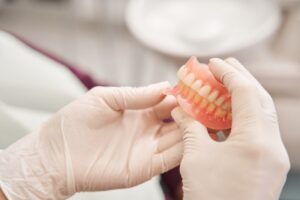
When properly fitted, dentures have the ability to last for several years and drastically improve oral function and confidence. However, with time, the jawbone can lose density and the prosthetic can become loose or ill-fitting within the mouth, leading to a variety of uncomfortable and compromising complications. Read on to learn about the five most common impacts that ill-fitting dentures can have on your life and oral health.
Swelling & Soreness
If your dentures no longer fit over your gumline correctly, it will cause them to rub and irritate the gum tissue due to constant shifting and slipping. The added friction against the gumline can then lead to irritation and swelling, ultimately making it incredibly uncomfortable to wear your dentures. Plus, because of the irritation and improper fit, you’ll also likely experience gum sensitivity and jaw soreness, limiting the comfort and mobility of the jaw joints and surrounding muscles.
Difficulty Eating & Speaking
Ill-fitting dentures can also make it very difficult to eat and speak due to oral sores and swelling in the mouth. As a result of this complication, people often also experience malnutrition due to a lack of nutritious foods in their diet. If you do try to eat with dentures that don’t securely fit over the gumline, it’s likely that food will become trapped beneath the prosthetic, leading to infections like gum disease.
Angular Cheilitis
Your dentures are carefully crafted to not just replace the top or bottom arches of teeth, but also create an even bite that doesn’t lead to jaw tension and discomfort. However, when the teeth don’t align as they should due to ill-fitting dentures, it can create an uneven bite that allows saliva to collect at the corners of the mouth. When this happens, a bacterial infection can develop due to yeast overgrowth, causing angular cheilitis. This can manifest as irritated patches of skin on the corners of the mouth, making it painful to eat and speak.
Persistent Headaches
If your ill-fitting dentures cause a misaligned bite, it can place added strain and tension on the two joints that hinge your lower jaw to your upper jaw, called the temporomandibular joints. A common side-effect of this is persistent, dull, and thumping headaches.
Loss of Confidence
One of the most impactful complications of dentures that don’t fit correctly is the loss of confidence as a result due to discomfort, inability to eat the foods you want, and difficulty speaking. With time, these effects can lead people to stop going out and avoid spending time with friends and family for fear of embarrassment.
About the Author
Dr. Rafiq Hirji brings over 10 years of experience. His top priority is to make sure that all of his patients have happy, healthy smiles, whether they have prosthetics like dentures or all of their natural teeth. If you’re experiencing complications of dentures that don’t fit comfortably within your mouth, visit Daily Smiles MacArthur Dental & Orthodontics’ website or call 972-546-4114 for help.
